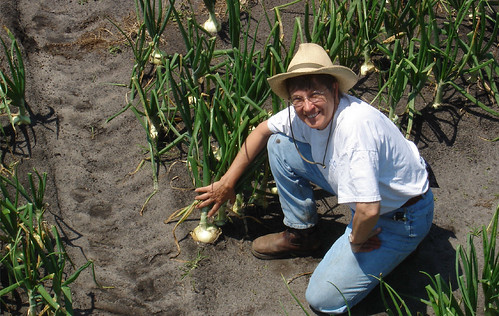
Being first can have its advantages and disadvantages. Relinda Walker knows that all too well.
Walker’s Organic Farm was one of the first organic operations in South Georgia. It took root in 2005 during a time when eating organic was for foodies and white table cloth chefs.
“No one was doing it in South Georgia,” said Walker. But when she presented the idea to the locals, “people were eager and chefs loved it,” she said.
Walker volunteered to be laid off from her job as vice president of operations at a technology company in New York in 2001 to come back home to Sylvania, Ga. She returned to care for her ailing parents and take over the land as a third generation farmer.
“I grew up on the farm but I didn’t have a lot to do with it,” said Walker. “I never intended to come back.” But as she got older, corporate life began to take its toll and she began to see the farm differently.
Trips to France encouraged her interest in food, so did local and national experts involved in the local food and go-organic movement. “I knew what I needed to do was come back and grow food.”
With a USDA organic certificate in hand, Walker began with specialty vegetables like haricots verts (French green beans), squash blossoms and fingerling potatoes. She later expanded her offerings to include Vidalia onions, rainbow carrots, snap beans, squash, zucchini, corn and peas. Catering her crops to the needs of local restaurants became her specialty. Morally, it was satisfying, but it was not profitable.
“I am about one hour from Savannah and an hour and a half from Augusta. It wasn’t worth the travel time for such small orders,” said Walker, who has 50 acres of organic land and another 17 acres that will be certified organic by this summer. She thought she would do better in the wholesale business, and she was somewhat correct. The volume of produce increased but the profit margins dropped.
Then she began direct marketing her produce through farmers markets and working alongside box programs, or consumer supported agriculture (CSA), that allows residents to pay for a weekly box of fresh vegetables and two online markets.
Walker said direct to consumer marketing began to take off and it also put her in touch with residents. “I like the direction and feedback you get from people. You develop a relationship with them.”
Walker’s farm is one of 141 organic operations in Georgia that have been certified organic as of this year, according to the U.S. Department of Agriculture. Since 2004, the number of organic acreage has increased by 892 percent, based on information from the Georgia Organics website.
Yet, mounting business pressure made her think about staff reductions, but reducing labor in an ailing job market was difficult.
“She hired people in the area, so for some of them it was their only job,” said Nikki Thomas-Mosley, farm loan officer with the USDA Farm Service Agency in Georgia. “She had to cut back on labor costs, but instead of letting people go, the alternative was not to have everyone on the clock at the same time.”
Walker turned to FSA to consolidate debt and receive help with operating costs. She originally went to a commercial bank, but was unable to secure funding.
FSA makes direct and guaranteed farm ownership and operating loans to farmers and ranchers who cannot obtain commercial credit from a bank or another lender. The government agency also provides training in management, bookkeeping and finance.
“FSA made it possible to continue [my operation],” said Walker.
Today, Walker supplements local labor with farm interns who live on the farm for a few months to learn about organic farming.
Through networking, providing workshops to the community and making connections through farmers markets and a CSA, Walker has positioned herself as an organic role model.
After paying back the operating loan she received from FSA, “she is now operating on her own this year. She has a program in place, she knows how to market her produce and she knows what she is spending and making on each crop,” said Thomas-Mosley. “She is really good at what she does.”


